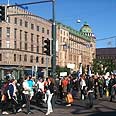
The recommendation was revealed by the security officer of the Jewish community in Helsinki in an interview to Yle, Finland's national public service broadcasting company in the Swedish language.
Yaron Nadbornik, president of Helsinki's Jewish community, said in response that the advice was not issued by the community leaders but rather given by the security officer to several individuals in private conversations.
"The situation for Jews in Finland is vastly better than in other Nordic countries and has historically been very good. I personally walk to synagogue with a kippa regularly and have not felt or heard any kind of harassment," Nadbornik added.
Only 1,500 Jews live in Finland today, many of them descendants of the Jewish soldiers who served in the Russian army in Finland in the mid-19th century, when Finland was an autonomous grand duchy of the czarist empire.
The soldiers eventually gained the right to settle in the Nordic country and created basis for the Jewish community, establishing a synagogue in Helsinki in 1906. When Finland became independent in 1917, Jews were given full civil rights.
During World War II, Jews served along with Finns in the national army, fighting aggressions from both the Soviet Union and, later, Nazi Germany. Despite repeated pleas from one-time ally Germany, the Finnish government refused to take action against Jews or deprive their civil rights during the war.
Besides the Helsinki house of worship complete with Jewish school, there is also a synagogue in the western city of Turku, where some 200 Jews live.
Ynetnews and The Associated Press contributed to this report















